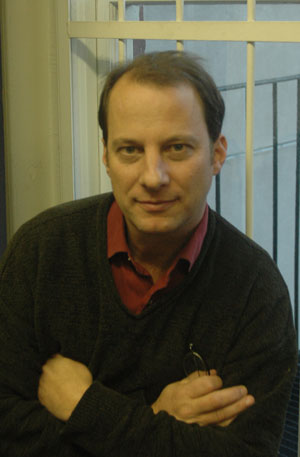
"Iíve never gotten used to this fact of daily life; though I keep my thoughts mainly to myself, I think about it constantly. And though I donít agree with the French and Turkish policies of forbidding the hijab in certain areas like schools or government jobs, I canít help seeing it as an instrument of oppression, rightly or wronglyóeven when itís the voluntary and self-imposed kind. Watching a woman at the airport in Jakarta trying to drink coffee under the veil of her niqab, an act that required all of her focus and dexterity and was almost impossible to do without spilling, reminded me of the images I saw as a child of Chinese women with tiny, bound feet." Journalist George Packer served as a Peace Corps Volunteer in Togo.
George Packer writes: The separateness of men and women is always the thing that strikes me, and disturbs me, most deeply about working in countries like Iraq, Afghanistan, and Pakistan
A War of Oneís Own
In part three of our roundtable, Amy Davidson asks Jon Lee Anderson and George Packer about the difficulty male journalists face in interviewing women in the Muslim world and the differences in how men and women experience war.
[Excerpt]
George Packer: The separateness of men and women is always the thing that strikes me, and disturbs me, most deeply about working in countries like Iraq, Afghanistan, and Pakistan. Nothing else about the conservative Muslim world comes close to providing such a stark contrast with the modern West, such an undeniable demonstration of cultural and political difference. I must say that it always feels like an entirely negative contrast. The muffling or outright sequestration of half the population drains the variety and vibrancy from public life, makes men less interesting and sometimes less sensitive, removes from the visible scene and the field of journalism one of the crucial aspects of human life.
I might struggle briefly with an attempt at anthropological relativism, but I soon give in and admit that the drastic limits imposed on women in publicóI was just in the Pashtun areas of Afghanistan and Pakistan, where the limits are almost totalóseem like a confession of some cultural failure, perhaps even the failure, the heart of the reason that war and oppression and intolerance are daily afflictions and, therefore, that I and other journalists keep visiting.
Iíve never gotten used to this fact of daily life; though I keep my thoughts mainly to myself, I think about it constantly. And though I donít agree with the French and Turkish policies of forbidding the hijab in certain areas like schools or government jobs, I canít help seeing it as an instrument of oppression, rightly or wronglyóeven when itís the voluntary and self-imposed kind. Watching a woman at the airport in Jakarta trying to drink coffee under the veil of her niqab, an act that required all of her focus and dexterity and was almost impossible to do without spilling, reminded me of the images I saw as a child of Chinese women with tiny, bound feet.
This separation inevitably affects the work. I spent enough time in Iraq, and the country still has enough of a hangover from its period of modernization, that it wasnít difficult for me to talk to women, especially ones over thirty or forty. What we could talk aboutóthatís another matter. Iím certain that colleagues who are women got a lot closer to the truth in matters of the body and the heart. And because war and politics are the magnets that draw my reporting in these countries, my notebooks overflow with the words of men; womenís voices are much harder to hear.












